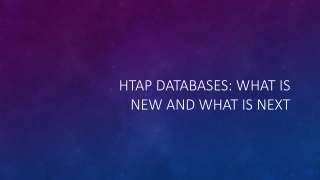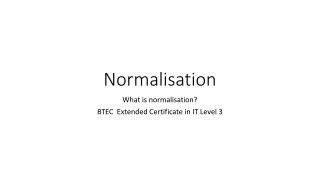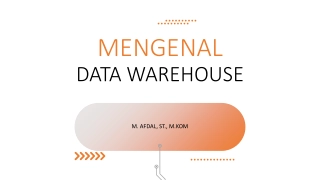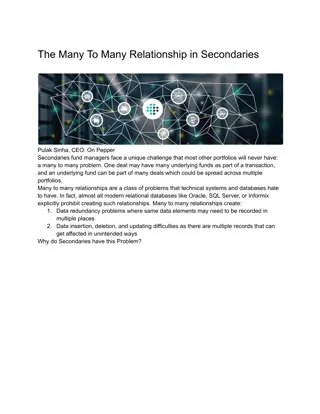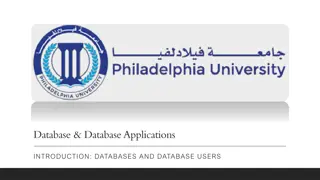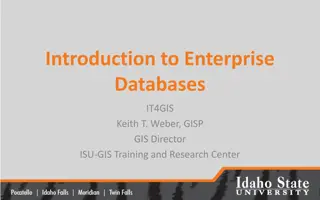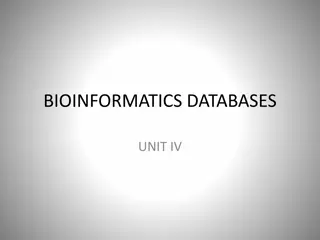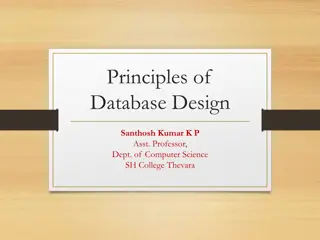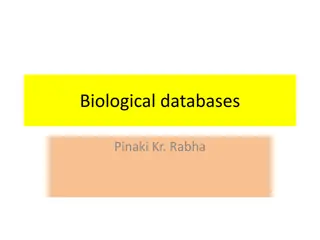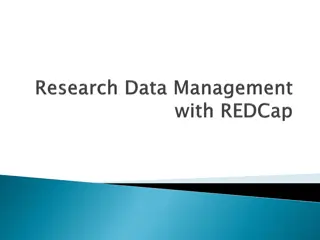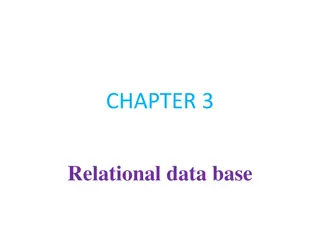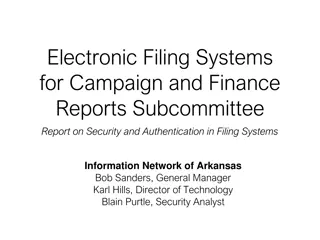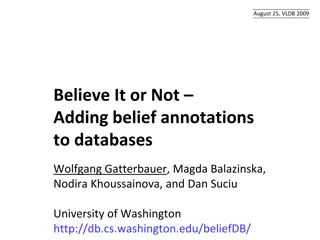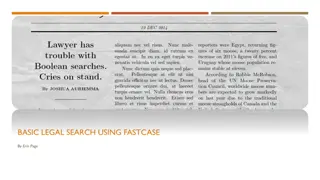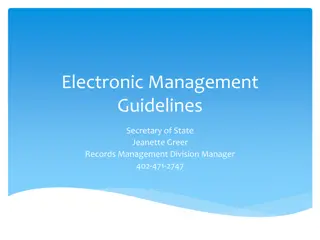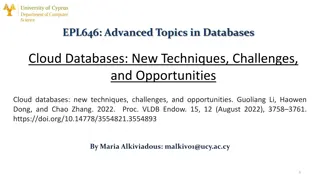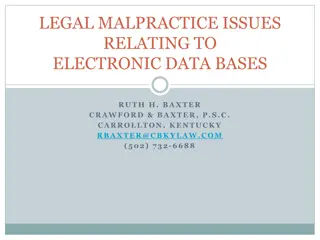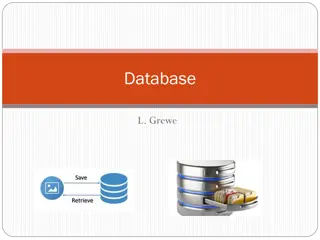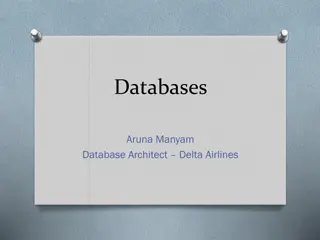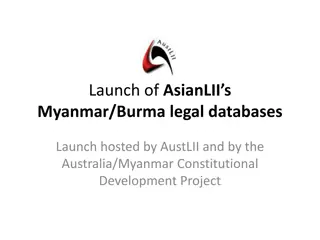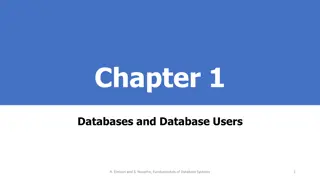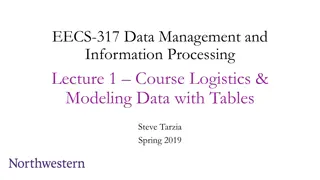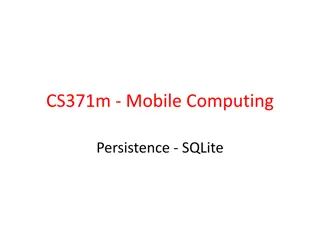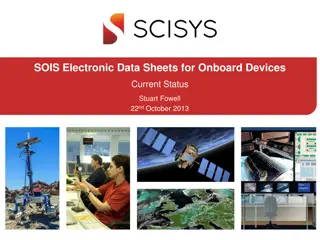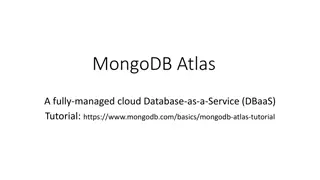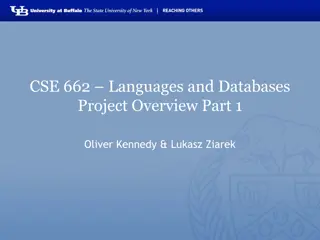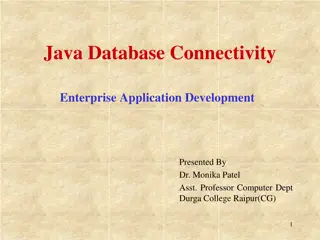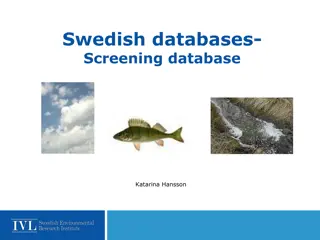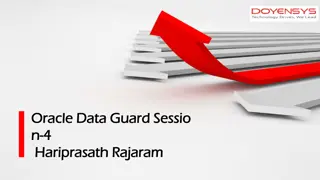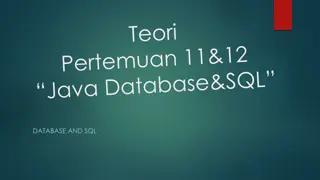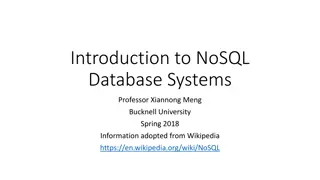Revolutionizing Data Management with HTAP Databases
Organizations handle a vast amount of data daily, necessitating efficient systems like Hybrid Transactional Analytical Processing (HTAP). This advanced system streamlines online transaction processing (OLTP) and analytical processing (OLAP), enabling real-time insights and prompt actions. HTAP datab
2 views • 22 slides
Normalisation
Explore databases in detail and understand normalization. Learn how to structure data efficiently in databases for optimal performance. Research and discuss the importance of normalization.
1 views • 20 slides
MENGENAL: Data Warehouse
Explore the importance of data, information, and knowledge in computing, evolution of databases, file processing vs. database processing, and the definition of Data Warehouses by Bill Inmon. Learn about structured data storage, database management, and the advantages of using databases over file pro
3 views • 19 slides
IEEE Council on Electronic Design Automation (CEDA) - Empowering Innovation in Electronic Circuits and Systems
IEEE CEDA, established in 2005, focuses on the theory, implementation, and utilization of EDA/CAD tools for designing integrated electronic circuits and systems. The organization aims to lead in providing technical information and community services related to the design and automation of electronic
3 views • 19 slides
Evolution of HTAP Databases: Advancements and Future Prospects
Organizations are experiencing a surge in data volumes, necessitating efficient systems like HTAP that combine OLTP and OLAP for real-time insights. This technology eliminates ETL processes, expediting data analytics and fostering business innovation. Primary row stores, in-memory column stores, dis
4 views • 22 slides
The Many To Many Relationship in Secondaries
Many to many relationships are a class of problems that technical systems and databases hate to have. In fact, almost all modern relational databases like Oracle, SQL Server, or Informix explicitly prohibit creating such relationships.
2 views • 2 slides
Understanding Databases and Database Applications
Databases are collections of related data used to store known facts with implicit meanings in a structured manner. A Database Management System (DBMS) is crucial in managing databases efficiently by defining structures, loading data, manipulating content, ensuring security, and facilitating data acc
1 views • 15 slides
Introduction to Enterprise Databases for GIS Professionals
Explore the world of enterprise databases through a GIS perspective with a focus on concurrent clients, database administration, creating databases/tables, checking service names, unique features, numeric data types, data type parameters in ArcGIS, and character data types. Gain insights into managi
0 views • 52 slides
Exploring the World of Bioinformatics Databases
Bioinformatics databases are essential tools in handling molecular biological data, classified into sequence and structure databases. Primary databases store raw data, while secondary databases contain curated information for research. Examples include GenBank, Protein Data Bank, and SWISS-Prot.
1 views • 38 slides
Database Design Principles and Management Overview
This document presents an overview of database design principles, including structured, semi-structured, and unstructured data types. It delves into the role of Database Management Systems (DBMS) in defining, constructing, manipulating, and sharing databases effectively. It also covers various types
0 views • 47 slides
An Overview of Biological Databases in Bioinformatics
Biological databases play a crucial role in bioinformatics, storing vast amounts of data related to nucleotide sequences, protein sequences, and more. These databases are publicly accessible and essential for research in biological fields. Primary databases, such as GenBank, EMBL, and DDBJ, contain
0 views • 13 slides
Understanding Data Management and Databases
Explore the concepts of data, information, and knowledge, learn why databases are superior to spreadsheets for data storage, and delve into the organization and functionality of relational databases for decision-making purposes.
0 views • 18 slides
Understanding the Importance of Databases for Research Data Management
Databases play a crucial role in research data management by allowing systematic organization, easy data entry, manipulation, and analysis. They enable storing and accessing data efficiently, ensuring data integrity and security, and facilitating complex queries and associations that are not possibl
0 views • 58 slides
Understanding Relational Databases and File-Based Systems
This chapter delves into the fundamental concepts of databases, comparing them to file-based systems, and highlighting the significance of relational databases in modern integrated AISs. It explores the difference between logical and physical views of databases, introduces key concepts such as DBMS
0 views • 70 slides
Security and Authentication in Electronic Filing Systems: Arkansas Subcommittee Report
Explore the subcommittee report on security and authentication in electronic filing systems for campaign and finance reports in Arkansas. Learn about user authentication, risks, mitigation strategies, and approaches used in other states. Discover the filing processes in both paper and electronic for
0 views • 24 slides
Understanding White Spaces Databases: An Empirical Study
White spaces in the TV band offer opportunities for unlicensed usage, motivating research on white space detection methods like geolocation spectrum databases and spectrum sensing. This study explores errors in white spaces databases, discussing the challenges and implications for white space device
2 views • 30 slides
Managing Belief Annotations in Databases: A Modal Logic Approach
Explore the concept of belief databases that enable data curation based on modal and default logic in a relational model. The work discusses managing inconsistent views in community databases and presents a motivating application scenario to illustrate the challenges and solutions in handling belief
0 views • 34 slides
Understanding Databases and Search Methods in Legal Research
Dive into the basics of legal search using Fastcase, exploring the concept of databases, integrated vs. non-integrated content, indexed and full-text databases, along with examples and the benefits of natural language searching in legal research. Gain insights on the types of databases, how informat
0 views • 20 slides
Understanding Stored and Inherited Relations in Relational Databases
Explore the concept of Stored and Inherited Relations (SIR) in relational databases, as discussed by Witold Litwin at Dauphine University. Discover how a typical scheme of a stored relation defines a natural SIR, leading to more efficient query formulations and less procedural querying processes. Le
0 views • 27 slides
Best Practices for Electronic Records Management
Electronic records management guidelines outlined by Secretary of State Jeanette Greer emphasize the importance of retaining and managing electronic records effectively. Understanding the definition of records, handling cluttered records retention, and managing electronic records properly are crucia
1 views • 19 slides
Emerging Trends in Cloud Databases: Challenges and Opportunities
Cloud databases have revolutionized data management, offering scalability and efficiency. This article explores new techniques in cloud-native databases, challenges faced in cloud DBs, and the architecture of Cloud OLTP and OLAP systems. It delves into the significance of OLTP and OLAP in different
0 views • 25 slides
Understanding Advanced Databases and Online Analytical Processing
Explore the world of data warehousing, advanced databases, OLTP, and OLAP with Dr. Nicholas Gibbins. Learn about traditional processing styles, multidimensional databases, and the dynamic analysis techniques of Online Analytical Processing (OLAP). Understand the importance of asking "what if" questi
0 views • 33 slides
Managing Draft & Proposed Clean Air Act Permits Using Electronic Permit System
Explore how the Electronic Permit System (EPS) streamlines the management of Clean Air Act permits, reducing paper usage, easing document handling, and lowering costs. Learn about the various requirements, tools, and practices involved in the permit process as outlined by the EPA Region 9 Air Divisi
0 views • 18 slides
Electronic Systems and Telecommunications Engineering Masters Programme at School of Electronic Engineering
This program offers Master's and Master Qualifier degrees in Electronic Systems and Telecommunications Engineering at the School of Electronic Engineering, with modules such as Image Processing & Analysis, Nanoelectronics & Photonics, Semiconductor Manufacturing, and Network Implementation. The prog
0 views • 25 slides
Challenges and Solutions in Legal Malpractice Issues Related to Electronic Databases
The use of electronic databases in legal practices poses challenges such as document rejection reasons, recording standards, and risks like employee errors. Solutions include statutes allowing corrections and clarifications to maintain document validity. Understanding the e-filing process and typica
0 views • 12 slides
Understanding Database Management Systems and Data Storage
Explore the world of Database Management Systems (DBMS) and learn about the evolution of data storage from flat-file to relational databases. Discover the key features of a DBMS, different database types, administration tools, SQL and NoSQL databases, CAP theory, and considerations for choosing betw
0 views • 32 slides
Understanding Databases and Information Technology in Delta Airlines
Explore the critical role of databases and information technology in Delta Airlines, the second largest airline in revenue globally. From data storage to operational efficiency, learn how IT powers various functions such as flight operations, customer service, revenue management, and more, ensuring
0 views • 25 slides
Launch of AsianLIIs Myanmar/Burma Legal Databases by AustLII
The launch of the AsianLIIs Myanmar/Burma legal databases hosted by AustLII and the Australia/Myanmar Constitutional Development Project aims to provide a valuable tool for researchers, improve access to legal information in Myanmar, and support priority projects. The databases offer resources for s
0 views • 4 slides
Overview of Databases and Recent Developments in Database Systems
Explore the fundamentals of databases, including types, applications, users, and advantages. Learn about traditional and recent database applications, such as social networks, search engines, and emerging technologies like Big Data systems and NOSQL. Understand the concept of databases as a collecti
0 views • 30 slides
Handling Complex Data with SQL Databases: A Powerful Foundation for Data Science
Learn how to manage real-world, complex data efficiently using SQL relational databases. Explore the limitations of Excel and Matlab in modeling data relationships and data integrity enforcement. Understand the importance of keeping data and analysis separate. Delve into examples of data sets beyond
0 views • 34 slides
Revolutionizing Bail Bonds: The Shift to Electronic Processes
Explore the future of bail bonds with the advent of electronic systems. Discover how electronic bonds are created, issued, and audited, benefitting both sheriffs and court clerks. Learn how to submit electronic bonds hassle-free, without additional software requirements.
1 views • 7 slides
Introduction to Relational Databases and SQLite for Mobile Computing
Covering the basics of relational databases, SQL, and SQLite, this content provides an overview of database management systems, their history, and the key concepts related to data storage and retrieval. It also touches on the practical aspects of working with SQLite in Android applications, outlinin
0 views • 61 slides
Advancing Electronic Data Sheets for Onboard Devices
Advancements in Electronic Data Sheets (EDS) are revolutionizing how device interface information is documented and utilized in space systems. The shift from traditional ICDs to EDS streamlines information consistency, completeness, and transformation, benefiting OBSW development, spacecraft databas
0 views • 23 slides
MongoDB Atlas Overview and Tutorial
MongoDB Atlas is a fully-managed cloud Database-as-a-Service offering by MongoDB. This tutorial provides a step-by-step guide on how to set up a free MongoDB Atlas account, create databases and collections, add database users, and explore and manipulate your data using MongoDB Compass. The tutorial
0 views • 34 slides
Database Benchmarking: Embedded Databases Comparison
This project involves benchmarking lightweight embedded databases like SQLite, BerkeleyDB, and others. Students will evaluate and compare these databases using specific workloads to analyze their performance. The outcomes include a detailed report on each system's strengths and weaknesses. Required
0 views • 19 slides
Introduction to Java Database Connectivity (JDBC) in Enterprise Application Development
JDBC, or Java Database Connectivity, is a vital technology in enterprise application development that provides a standardized library for Java programs to connect to databases via SQL commands. It abstracts vendor-specific details, making connectivity to multiple databases seamless. JDBC API standar
0 views • 13 slides
Environmental Monitoring and Screening Databases in Sweden
This content delves into the monitoring and screening databases managed by Katarina Hansson at IVL, focusing on chemicals, emissions, and national environmental data in Sweden. It covers the use of national databases, biota databases for pollutants in biological samples, and screening studies involv
0 views • 10 slides
Oracle Data Guard: Training Objectives and Far Sync Instances
This content highlights training objectives for Oracle Data Guard, focusing on the new features such as Far Sync Instances and Active Standby Databases. It covers configuring Data Guard Broker, plugging Pluggable Databases, recovering Standby Databases, and achieving a highly available Oracle Databa
0 views • 25 slides
Understanding Databases and SQL: A Comprehensive Overview
Databases are fundamental in computer-based record-keeping systems, essential for organizations to maintain and access crucial information efficiently. This comprehensive guide covers the significance of databases, advantages of centralized databases, database models, relational databases, and more.
0 views • 52 slides
Understanding NoSQL Databases in Modern Data Management
NoSQL databases offer innovative storage and retrieval mechanisms for diverse data types, deviating from traditional relational databases. This article explores the history, definition, advantages, challenges, and types of NoSQL databases, shedding light on their pivotal role in current data managem
0 views • 11 slides
